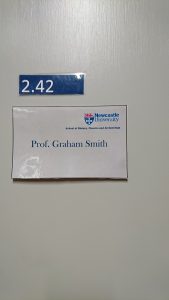The international Memory Studies Association recently released the call for papers for its 2023 conference, to be held in Newcastle. Oral History Collective member Dr Alison Atkinson-Phillips is part of the organising committee. Here she explains why she’s so excited to see this particular conference held here in the North East.
Continue readingCategory Archives: Opportunities
Funded PhD opportunity: Oral History’s Design: A creative collaboration.
Sustaining visitor (re)use of oral histories on heritage sites: The National Trust’s Seaton Delaval Hall AS A case study.
Oral history’s popularity as an active collecting method and archiving tool have outstripped the level of reuse of oral histories in historical interpretation. And while oral history’s limited reuse of archived oral histories has attracted some interest, this is based mainly on proposed digital technical fixes. Significantly, there is relatively less research on the dissemination of oral histories and their reception by audiences. Oral history as an emerging discipline has yet to adequately integrate users and audiences into the processes of analysis and reuse.
Continue readingSearching for voices from the North East’s shipbuilding past
Full Media Release: https://www.ncl.ac.uk/press/articles/latest/2018/08/saveourshipyardshistory/
Voices from a historic campaign to save the North East’s shipyards are being sought in a bid to remember the real life experiences of those involved.
The Oral History Unit’s Dr Alison Atkinson-Phillips wants to track down people who took part in the ‘Save our Shipyards’ campaign that took place from 1983-84 in a bid to stop the closure of yards on the Tyne and Wear. Workers from Swan Hunter on the Tyne and Austin & Pickersgill on the Wear, their families, union leaders and local politicians, were interviewed for two short films known collectively as the ‘Shipyard Tapes’.
The first film ‘The Price of Ships’ explains the economics of the global shipping industry, highlights the strengths of the yards on the Tyne and the Wear and argues for further government support. The second film ‘Down the Road Again’ warns of the dangers of the yards returning to private ownership, cautioning that it risked returning to the type of unsecure, casual labour that shipbuilding was known for before nationalisation.
Originally commissioned by the Tyne and Wear County Council, the two twenty minute films have been preserved and are part of the collections of North East Film Archive, who are working with Newcastle University on the project.
Email oralhistory@newcastle.ac.uk for more information.
Advertising: Our second researcher post
Here below is the formal advert. But please go the University jobs website and search: work and After.
Continue readingUpdate: Recruiting for first researcher’s post
I am now in post as the Unit’s Professor of Oral History and involved in recruiting two research ers. I’ve been shortlisting with the Head of History for the first researcher post. There were 32 applications in total. The overall quality of applicants was exceptionally high and I’m very much looking forward to interviewing those we have shortlisted early next month.
ers. I’ve been shortlisting with the Head of History for the first researcher post. There were 32 applications in total. The overall quality of applicants was exceptionally high and I’m very much looking forward to interviewing those we have shortlisted early next month.
I have also started to make contact with oral historians in the region and reports on these meetings will follow.
Graham Smith, 19 September 2017.
